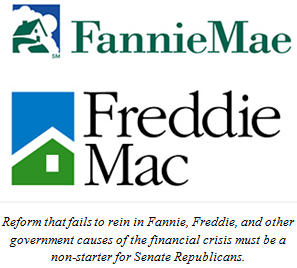
The problems with the bill are legion. It grants unlimited authority to the government to take over any company deemed “too risky”, and includes the power to levy limitless assessments on financial institutions to finance these government takeovers, which the American people will pay for, all without any vote in Congress. And investors whose assets are wrongly seized would be barred from any judicial review of the government seizure, raising very serious due process property rights concerns.
For now, blocking the Dodd bill is a tactical victory for the American people, but in order to avert another unprecedented expansion of the national government, an honest accounting of the root, government causes of the crisis is absolutely necessary. A proper response must focus upon the government spheres of influence that contributed to the credit bubble that, when it popped, nearly brought the global financial system to its knees, and which may yet bankrupt the Treasury.
In that spirit, Senate Republicans need very firm, non-negotiable preconditions for real financial reform. These must include reining in the government agencies that helped to foster the financial crisis to begin with:
1) Fannie Mae and Freddie Mac that weakened mortgage underwriting standards and mislabeled high-risk mortgage-backed securities, defrauding investors;
2) the Federal Housing Administration (FHA) that lowered down payments on mortgages;
3) the Department of Housing and Urban Development’s (HUD) Community Reinvestment Act regulations that reduced lending standards and forced banks to give loans to lower-income Americans that could not be repaid; and
4) the Federal Reserve whose ultra-easy money policies and lower-than-justified interest rates that allowed the credit bubble to inflate to catastrophic proportions in the first place.
Fannie and Freddie reform must be the cornerstone of real financial reform. As noted from research by the former Chief Credit Officer of Fannie Mae, Ed Pinto, the losses to the GSE’s because of this excessive risk-taking pushed them into bankruptcy. By June 2008, Fannie and Freddie had taken on some $1.835 trillion in higher-risk mortgages and mortgage-backed securities just before they were nationalized. These included high risk loans in whole loan form, most of which, $1.646 trillion, were GSE-issued mortgage-backed securities, and $189 billion of subprime and Alt-A private mortgage-backed securities.
Further, the Dodd bill does nothing to rein in the inherent moral hazard of taxpayer backing of Fannie Mae and Freddie Mac, with a total of $6.3 trillion in liabilities including $4.7 trillion of mortgage-backed securities. It will do nothing to clear the Federal Reserve’s new portfolio of $1.25 trillion of securities it purchased from the GSE’s. It therefore brings no clarity at all for how these mortgage bailouts are being paid for. Are they backed by taxpayers? The Federal Reserve? Are they going to be sold off to the private sector?
These important questions must be answered with real financial reform. The American people have to decide if they want a nationalized mortgage sector or not. And they have to be informed — by their elected officials — that to do so will mean bringing some $6.3 trillion in liabilities onto the nation’s balance sheet. Americans for Limited Government suspects that if granted the choice, given government’s horrendous track record as stewards of credit and lending, the people will opt to bring an end to the bailout. That they will decide that Fannie and Freddie should be sold off piece by piece and put out of business for good.
The American people will support stronger lending standards, greater capital requirements, and to that end, would support the repeal of the Community Reinvestment Act and the HUD regulations that enforced it. The people also support bringing more transparency to the Federal Reserve, and in restricting the use of monetary policy to advance social policies like increasing home ownership for low-income Americans. A monetary policy that was primarily focused on price stability would have never allowed the housing bubble to reach its devastating levels. The people have a right to expect public oversight via the Government Accountability Office at the Federal Reserve, which is currently prohibited.
The Dodd bill does nothing at all to address these root causes of the crisis. It instead proceeds from a mistaken premise: that if Lehman Brothers had been taken over by the government and bailed out, like AIG, Bear Stearns and others, the crisis would not have occurred. That if the bailout had been somehow “managed” better and faster, without the inconvenient, time-consuming votes in Congress, that it could have somehow been averted. That is why Dodd has proposed an unlimited, speedy “resolution” authority with its limitless powers to tax and spend in order to seize any company deemed “too risky.”
Ultimately, that is the trouble with the Dodd bill. The American people really do want an end to “too big to fail.” They really do want a stop to the bailouts and takeovers, and they understand that the only way to do that is to, well, stop the bailouts and takeovers. Real reform will restore risk to markets and eliminate the moral hazard posed by bailing out investment firms. Real reform must therefore mean that bailed-out firms like AIG, Fannie, Freddie, GM, and Chrysler are all brought off the government’s balance sheets. The Dodd bill institutionalizes government bailouts and takeovers — forever.
And Senate Republicans need to just say no. They have to bring non-negotiable reform planks to the table that will eliminate the current bailouts and takeovers, reform the root, government causes of the crisis, and reject the blatant power grab contained in the Dodd bill with unlimited authority to tax and spend without any vote in Congress, and to seize assets without any recourse to federal courts.

